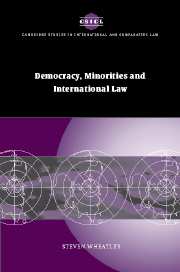Book contents
- Frontmatter
- Contents
- Acknowledgments
- Table of cases
- Table of treaties
- Table of UN resolutions and OSCE and other documents
- List of abbreviations
- Introduction
- 1 The rights of minorities
- 2 The self-determination of peoples
- 3 Democracy
- Conclusion: the accommodation of diversity
- Index
- CAMBRIDGE STUDIES IN INTERNATIONAL AND COMPARATIVE LAW
3 - Democracy
Published online by Cambridge University Press: 27 October 2009
- Frontmatter
- Contents
- Acknowledgments
- Table of cases
- Table of treaties
- Table of UN resolutions and OSCE and other documents
- List of abbreviations
- Introduction
- 1 The rights of minorities
- 2 The self-determination of peoples
- 3 Democracy
- Conclusion: the accommodation of diversity
- Index
- CAMBRIDGE STUDIES IN INTERNATIONAL AND COMPARATIVE LAW
Summary
The international community has recognised the rights of persons belonging to minorities to cultural security and the collective right of peoples to self-determination. It has failed to define the relevant beneficiaries of the rights, or to detail the circumstances in which measures to protect and promote cultural security should be introduced, or territorial self-government regimes established. There exists a regime of indeterminacy in relation to the position of ethno-cultural groups in international law: principles are recognised, but without detailed rules being elaborated as to how those principles are to be put into effect. States' policies concerning ethno-cultural groups – minorities, national minorities, indigenous peoples and peoples – will be decided within domestic institutions.
The traditional position of international law has been to regard the systems of government and the process of decision-making within sovereign and independent States as falling outside of the legitimate concern of the international community. The recognition of democracy as an obligation in international law changes this – for democratic States. This chapter examines the recognition of a right to democracy in the International Covenant on Civil and Political Rights. It considers the rights of political participation available to all citizens, and the particular rights of minorities to effective participation in decisions which affect them. The work recognises the limits of procedural inclusion in protecting the interests of persons belonging to national or ethnic, religious and linguistic minorities in democratic States, and considers two institutional responses proposed by writers in political science: consociational and integrative models of democracy.
- Type
- Chapter
- Information
- Democracy, Minorities and International Law , pp. 127 - 190Publisher: Cambridge University PressPrint publication year: 2005

